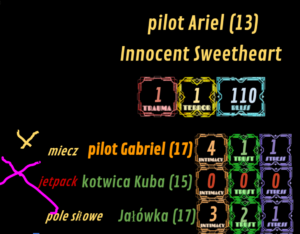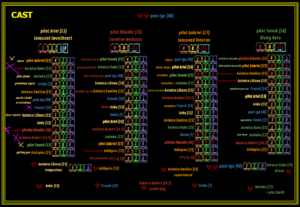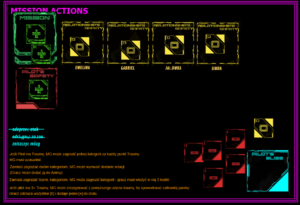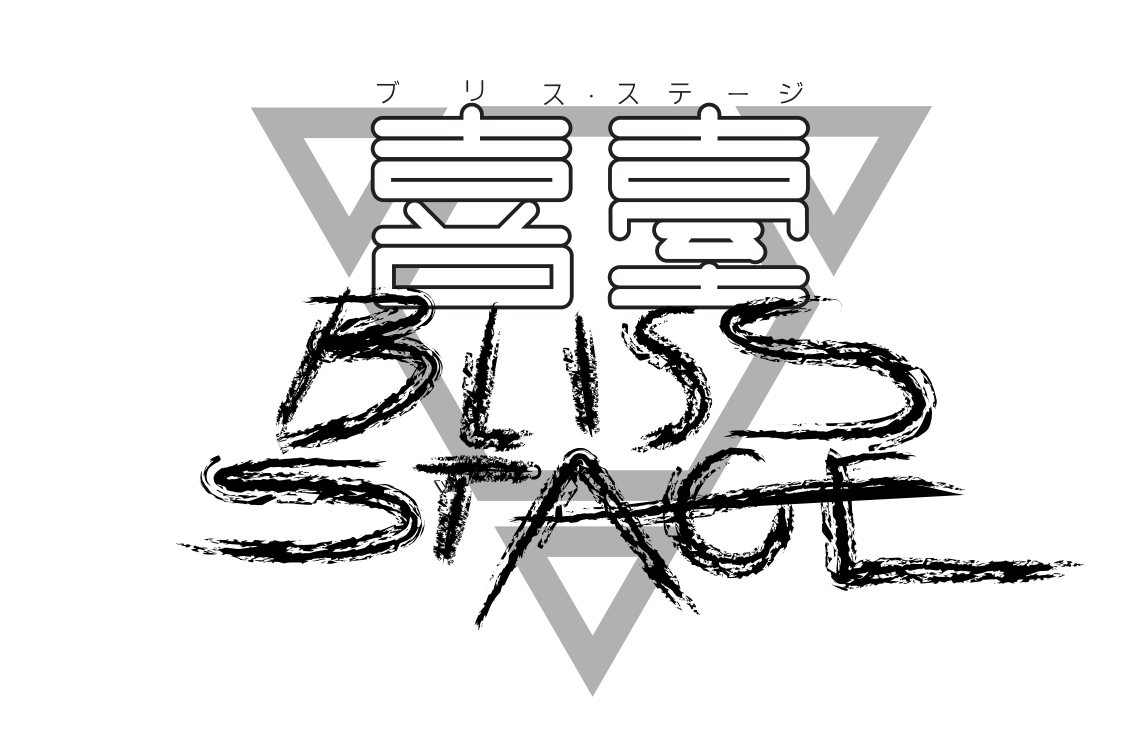Hi all!
I’m more of a discord person but to please Ron I decided to post it here (it will be my first post on AP).
For last two months I run 8 sessions (plus session zero) of Ben Lehman’s “Bliss Stage” from 2007. We played online using discord plus roll20 as our UI. I also tried to use Luxton Technique for safety measures (or as our danger tool), discovering Ben Lehman is now known as P. H. Lee. Yes, it was totally coincidently but in my head the two (game and the technique) compliments one another quite well.
I planned to play it for a long time but as it was quite intimate game about teenagers in mechs on a war with an alien forces and a game in which intimate relations strenghten your dream world armour, it took me some time to find a group I can play it comfortable with.
What I love about the game is how it’s mechanics shorten the distance between be and the fiction. It has several nicely located mechanisms I tried to show during play. Firstly, we play in a space we all know. In our case it was the hardest part as my group was from different cities in Poland. I proposed Wrocław as I’m living here my whole life and during our pre play discussion everyone remembered our city zoo so we located our resistance cell there. Since 2012 I’ve been in Wrocław’s zoo 6-7 times so I had pretty good recollection of it’s topography and buildings but unfortunatelly other players were there once during their lifes so during play we must have abstractise this place to avoid several “actualy…” discussions mid of play. I grieve over this, because I pretty much don’t expect session to have a steady rythm and tempo and I would rather have this discussions to make the zoo more concrete (we even have the map of a zoo on roll20 page). I believe many of our group problems with fictional space were caused by that lack of a shared picture. Next time I would surelly find a group from within my city of from the city I’m more accustome to.

Secondly, during prep we decide upon how the aliens look like or fell like, which is based on our last nightmares. As in game the aliens comes from the dream world and all adults (despite one) felt asleep 7 years ago (yeah, it’s a near future postapo game and the first session starts with “ok, we fall asleep now, as we sit and then 7 years later our play begins”), this nightmarish vision of aliens is another element I loved reading about. The game is divided mostly into mission and interlude scenes. During mission scenes we usually encounter aliens and sometimes fall into a nightmare so sharing ideas let us build nightmares and aliens more horrific for us as people at the table. I enjoyed it quite much.
Lastly I will note that one of my responsibilities as a GM is naming a anchors (teenagers navigating pilots from real world – I imagine it is like in the Matrix, the guys in front of a computers with weird symbols and numbers). The game text instructs GM to name the anchors after their crushes (ones we don’t know anymore and never knew we were in love with them). It’s another layer of building emotional bound between players and characters. It worked quite well for us and I’ve seen players cheering for the characters and their relations with each other as a main interest of play (it is more of a teen drama than war story but maybe they are all just similar).

I said lastly? Sorry, another way Bliss Stage uses to strenghten our feeling is making us decide what is more important for us by using otherkind dice mechanism, where mission aim, pilots harm and our relations are always at stake. I find it very clever to use random element of the game to make us decide on the outcome. The otherkind resolution is used in mission scenes but there is also quite impressive mechanism for interlude scenes (relation scenes) where third person is judging how the scene is going and how it changes the relation between characters in it.
Bliss Stage makes other players the source of uncertainties in a few places but it really shines in interludes where my pilot my need to get rid of trouma so they start speaking about their problem but the other character can support it, or swich to “it’s always about you, you and you!” making it trustbuilding or stress reliefing scene (judged by the third player, whose view can be yet different!). It was a source of many heart-warming and heart-breaking scenes. I totally recommend the game.

I enjoyed the play very much and will probably play again next year. For last few years I was looking for games that would help me immerse in the fiction and sink cause emotions to flow. Bliss Stage did it quite well. It’s structure revolves around different kind of scenes but not in a wigdety way (at least I felt enough space to zoom into parts we were interested in with constant threat of aliens attack).
One last thing, reading Bliss Stage I tried to make some diagrams (altought mostly instructing play not exactly looking for changes). I’m leaving them below for discussion or future use if I menaged to interest anyone into trying the game themselves.



8 responses to “Into the bliss”
Ok, sorry, I’m quite bad with technology and all screens I’ve seen during wrighting just disappeard after posting^^’ Any advice how to avoid it in future?
I’ll help you with the format. We’ll discuss it on Discord.
I’d like to know about any time during play when you and the group felt safety measures were necessary, and used the technique you referenced. What was happening in the fiction and how was it played among you?
This may or may not be related, but I’d also like to know whether play featured sexual content among any player-characters and/or non-player characters. For example, the text explicitly calls out sex between the single adult NPC and any other character as both problematic and likely to be happening.
Sure!
As a side-note I will mention that all players me including were adults and we played in that configuration for the first time (five people in total, two I never played with and two I knew).
During session zero I described Luxton technique as a tool to not change what has already been established but to “take the mic” and let the rest of the group know what we need (with examples from the source: a short break, a cup of water, for X to happen, for X to not be described in detail or for X to be under my control).
Session zero took us long and we ended choosing relations between characters exhausted. One player was irritated by the other because they didn’t pay attention to video chat and spoke exactly when the first one were ready to tell what they decided upon. Unfortunately they didn’t use the tool and tell about it after the session so we had a brief discussion reminding that Luxton technique requires trusting that we aren’t being disturbing on purpose and we should trust that pointing such problems when they occurs would work better (giving second player a chance to be more attentive and change unwanted behaviour).
During first session we used it maybe twice (by one person up to my recollection) to state their expectations. It was when someone started describing their scene without giving much details to the situation and scenery, going straight to the dialog between characters. Second time it was when someone (experienced in “Bliss Stage”) wanted to make missions as short as possible (they played climaxing only once every mission in their earlier experience, paying no attention to the dangers in the dreamworld) to play more teenage drama. The tool was used to let the person know that in another player opinion it would lessen the impact of missions. In my opinion it was an impulse to make the game more dramatic and unfortunately by the end of campaign some part of the group were calculating their bliss to be as close to 108 as possible what was up to my taste unnecessarily forced.
Around session 2-3 it was used once to let us know that gory eye details are off limits. I think we accommodate to each other styles quite quick but not without some intent clashes (emergency vs dramatism, but I let it pass).
I believe we used Luxton for the last time on session 7, when during a scene I described that character’s dog has a black salvia like aliens blood and make one of my characters arguing that the dog must be put to sleep. One person take the voice to let us know they need the dog to survive and to nothing bad happen to it. As the conflict turned naturally into other direction, in subsequent mission I described as the portal to the dreamworld opens from the dog’s dream (in a comic-like bubble). The dog survived.
I think using Luxton Technique in advance (like modern, tool version of lines & veils) and to give us some insight to something that happened already instead of removing something already in fiction is worth further investigation.
Before hearing about Luxton I remember one player using it unconsciously during “Imp of the Perverse” campaign. They elaborated upon the subject of stalking which was very distant to my knowledge and experience but it was the main theme of one of the monsters. After hearing their insight the monster became much scarier and I think it enabled me to see the scariness of being stalked which I took much less serious prior to the play. Using it during “Bliss Stage” where there was much potential for abusive relations felt natural to my but I have very little experience with kids so I hoped for similar insight. I believe it was given by one player, which are a professional pedagogue but more in unstructured way, during roleplay. It strikes a chord for me when you speak in some materials about the strength of people struggling with their difficulties and how people without this difficulties are more exposed hearing about them in detail during play. I’m looking for tools to enforce such insight for me. I’m not sure about others but I see it both educating and making myself more empathic.
I don’t think our use of Luxton Technique affected our play very much. I will surely try to check it in other instances of play, maybe concentrating on the insight aspect I’m especially interested in, evolving it into other tool for personal usage.
As for intimacy we hadn’t play explicit sexuality. One character had 5 Intimacy with our Authority Figure but this relation broke during the first scene between them without any screen time. One of the pilots (hedonist one) had sex with another pilot and one of the characters added to the group as an double agent in another group from Wrocław (occupying Medical Academy near zoo). The pilot get pregnant but again, we roleplayed just some flirt, kisses (with drug exchanging), cruel plots to hurt another character by sleeping with cool veteran pilot and some hugging with yet another pilot not interested in sex.
There were other intimate scenes like one of the pilots with female genitals felt masculine but our Authority Figure and their brother couldn’t grasp the concept at first (it was also presented vaguely as a child could think about it without common knowledge we have now). Mixed with their trauma it caused some abusive scenes with 7-year old among the group who were firstly almost drown and a few sessions later undressed and threatened, causing him to run in terror through the zoo.
There was also a scene where one character (anchor in love with veteran pilot) did some gig for a rival group for a pack of condoms. As she left right before the alien attack it caused other anchor to work with a few pilots one after another and the base getting destroyed. Unfortunately the anchor never get to use the condoms as the veteran pilot scolded her and in close up distance told he would never “do her”. Earlier she endangered her pilot to flirt with veteran during mission (and used panic button to avoid getting hurt as her relation with her pilot broke).
There were also a few romantic scenes between veteran and rising hero pilots. They were talking about running from the group, drinking with each other and kissing each other right before blissing out during last mission. It was quite sweet and we didn’t veil it.
Oh, and first menstruation of hedonist pilot were quite interesting scene with her bestie lending her handmade pad. No untasteful details but the scene was quite intimate and heartwarming.
I think we avoided describing sexual intercourse just naturally (as you wrote lines and veils emerges in a group) and needed a tool mostly for eye-gore and animal violence (well maybe not for toxic frogs our Authority Figure used to make anti-sleep toxin).
In other my games we often used X-card (or mostly it’s variation) as a mean to rewind a description (for example character’s name, too stereotypical detail or as an emergency when miscommunication caused some distortion). The scene I remember the most is a “Mouse Guard 2e” game where I introduced NPC mice with pink bow and one of the players X-ed it as too stereotypical so I asked for an input and we ended up with something like a violet scarf I believe. It took us 30 seconds with a stopper (session is online but in polish), mostly because I couldn’t quickly find less obvious detail and asked for help. Yep, I’m that person using X-card in their games as a mean to challenge others input^^’ I feel it more disruptive to remove something than adding context or restrictions to it.
Sorry for long post, I wanted to be as precise as I can. To sum up I don’t think Luxton Technique give me what I hoped for and also I’m not sure we implemented it successfully. I would need some further testing and maybe design something more useful for me and my taste.
Wafergix,
Se interesting, resonant sexual and gendered play here! If you domt mind me asling, what was the gender makeup of the play group and the player characters?
Atrocious typing there, my apologies. Let me know if you can’t decode it and need me to restate.
Hi, Wafergix! Very glad you shared this post. One question sprung to mind as I was reading it-
“I believe many of our group problems with fictional space were caused by that lack of a shared picture.”
If you don’t mind, I’d like to hear a bit more about how this manifested in play. I’ve had my own experiences with these kinds of maps- not explicitly part of play procedures, but valuable or even necessary for figuring out where characters are in play- and my inclinations point towards what I perceive as overpreparing said maps. So I’m interested in your experiences here, to broaden my own understanding.
Sure! So nowdays I’m more accustomed to theatre of mind and my players shared this trend. People are used to playing scenes in the void with no respect to physical space. In our play the main two problems were:
1) people ignorong scene during their actions and descriptions – what caused misunderstanding of the situation (did you just destroied our walls? what are you leaping over? why are you ignoring this building being attacked?!),
2) people being uninterested in the backdrop (it’s a game about teen-drama do why should we care how characters take shower? Can we just put a random building there, even if we have a map, so we don’t need to orient on it?.
It caused some tensions as some players were loosing their understanding of the situation (whare is the ANIMA? where is the danger? Why are you doing it?) and others were trying to build scenes and drama around the setting that didn’t exist. I feel this commonly known space was meant to enforce more details and drama around the setting and we just weren’t in the same page with it, loosing some engagement and interest in this part of the game.